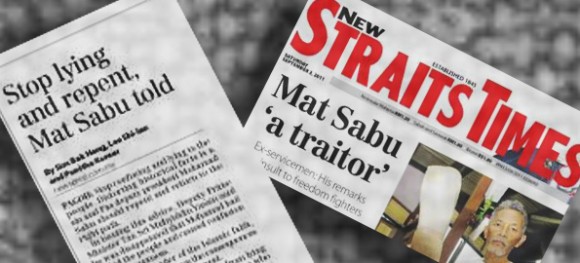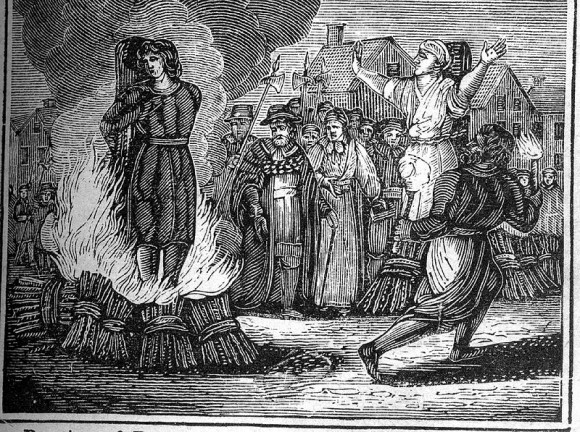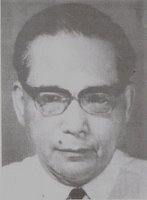THERE has been much politicking over PAS deputy president Mohamad Sabu (Mat Sabu)’s remarks on the Bukit Kepong incident in 1950. In a speech on 21 Aug 2011, Mat Sabu had questioned the portrayal of Mohammad Indera in Malaysian history as a terrorist. Mat Sabu said that Indera, who led an attack on a police station where 25 people were killed, had been fighting against the British.
The remarks were roundly condemned, have repeatedly made front-page news, and received wide coverage in papers such as Utusan Malaysia and the New Straits Times. Barisan Nasional leaders lined up to accuse Mat Sabu of having pro-communist tendencies. Some leaders are also eager for a debate, purportedly to set the record straight.
But history can be contentious, depending on who you ask, and events from the past can be selectively used today for political gain. What else is there beneath Mat Sabu’s remarks and the ensuing war of words? And while some think the entire episode is a waste of time, are there things we can learn? The Nut Graph asks political scientist Wong Chin Huat for his views.

TNG: Why has there been such a strong reaction from the traditional media and Barisan Nasional (BN) politicians against Mat Sabu’s remarks on the Bukit Kepong incident? There also seems to be a recent rise in the condemnation of communist ideology as a whole by BN politicians. Is there any particular reason for this?
Mat Sabu’s remarks challenge the official version of Malaysia’s history. Malaysia’s official history is one that aims to perpetuate the rule of Umno, which necessitates the deification of the role of Umno in achieving independence. I find it hilarious because in a way, Umno is behaving like the communists they are trying to demonise. I don’t think there’s much difference between Utusan Malaysia and the Communist Party of China’s People’s Daily.
Our official history is not so different from the official history of communist China and Vietnam. One-party states, whether de jure or de facto (i.e with elections), need to sell their populations one simple storyline: We founded the country, we are the natural governing party, you have to be thankful and loyal to THE party. But all parties are elitist in the sense that they cannot cover the entire nation. Hence, they must be packaged as representing the dominant population group.
In communist countries, the party is the representative of the proletariat. In Malaysia, Umno claims to represent all Malays, and claims that the Malays’ kindness to share the nation with others is the country’s foundation. Ever wondered why the government did not celebrate Malaysia Day nationally until 2010? Because recognition of the Sabahans’ and Sarawakians’ roles in nation building would dilute Umno’s claim and undermine its fantasy that this country is still Tanah Melayu and not Malaysia.
Mat Sabu’s challenge poses a greater threat to Umno’s fairytale: Not all Malays were supporting Umno in the independence movement. In fact, some Malays saw Umno as a sell-out working together with the British.
Umno’s ideological hegemony is built on two premises. First, that there is no left-right divide among the Malays. Second, that the real divide in Malaysia is communal, i.e. between Malay-Muslims and the non-Malay non-Muslims.
The 1981 movie Bukit Kepong aired almost every Merdeka Day fits well with such propaganda. It portrays Mandarin-speaking guerillas trapping and ambushing nice Malay police [personnel].
How will PAS and Umno be affected by Mat Sabu’s remarks and the subsequent attack on him?

Despite the witch hunt on Mat Sabu, the damage to Umno is done.
The emperor’s new clothes have been exposed. The Bukit Kepong communist attacks were led by a Malay, driven by his passion to end British colonial rule. While one may disagree with Mat Indera’s struggle, it is obvious the independence movement was not monopolised by Umno. If you take the leftist position, Umno is seen as the “good cop” to the British. Meanwhile, the “bad cop” (the communists and other leftists) were demonised in history.
Mat Sabu and PAS may have to pay electorally in the short term for alienating the police, military and civil servants. But this episode has also delegitimised Umno’s historical claim on nationhood permanently. Instead, it has prepared the nation ideologically for a multiparty democracy. Future generations will think of this with gratitude.
Are the strong condemnations of Sabu’s remarks justified? Is there any historical context that has been overlooked or downplayed in the articulation of this issue by politicians and the media? What are we missing in the analysis of this issue?
Mat Sabu’s remarks certainly did not deserve the media lynching that has occurred in recent weeks. However, there are serious issues that warrant debate, such as the legitimacy of violence in the struggle for independence.
On a macro level, with perhaps the US as the only exception, countries that won independence through military struggle almost inevitably saw the politicisation of the military and the militarisation of politics. We see this in Dutch-colonised Indonesia, British-colonised Burma and uncolonised Thailand, where a military coup ended absolute monarchy in 1932. Soldiers refused to just stay in the barracks. Vietnam, Laos, and, earlier, Cambodia, simply became one-party states where the military was part of the ruling party. Had Malaya/Malaysia won independence via military struggle, we may not have even the form, let alone the substance, of democracy.

On a micro level, the police and their families in Bukit Kepong and elsewhere shouldn’t have died even if they were part of the colonial apparatus. Neither should have those who believed in complete decolonisation who died in combat or custody. Those men and women who died for their cause are admirable, even if we disagree with their causes. Political violence is a tragedy, and this should be recognised by all sides.
The question we should and must ask is this: Could the communist insurgency have been avoided to spare all the lives and properties lost? In India, the communists were accepted in the political system and fought their ideals via electoral and legislative pathways. In fact, they were long-time ruling parties in the states of West Bengal and Kerala, where they did not prohibit religion or abolish property rights.
Why couldn’t the Malayan and Sarawakian communists be habilitated for electoral politics? If the banning of communism was to protect British interests and delay or dilute decolonisation, then from a purely nationalist viewpoint, the communists’ struggle for an independent Malaya was vindicated, at least before 1957.
There have been editorials and comments by academics emerging from this incident that Malaysia should relook its history, especially the history of the Malayan Communist Party. Is this necessary? What kind of political repercussions could such a reexamination cause?
We need to relook our entire history with more inclusive views. I am so glad Malaysia did not become part of Indonesia Raya under Sukarno or whoever his successors were. I am genuinely grateful for the birth of Malaysia, which actually was nothing but the outcome of crude calculations on geopolitics and communalism. The Malaysia project is not as beautiful as the official propaganda would like us to believe, but it can be as beautiful as we are willing to endeavour and sacrifice to make it work.

But history is really just that, often the outcomes of unintended consequences. And we, as actors in history cannot know for sure if our choices will be right. Hence, the rightful parties must not just wipe out the role and contribution of those who have made the wrong choices in hindsight. Who am I to blame, for instance, Ibrahim Yaakob, a founder of the leftist Kesatuan Melayu Muda, for preferring Indonesia over Malaysia?
We should recognise the roles of all who have left their marks and made us who we are, whether we like them or not. A great nation must afford honesty before history. If the future of this country depends on lying about or covering up the past, we are in deep trouble because we don’t even know who we are. ![]()
Wong Chin Huat is a political scientist by training and a journalism lecturer by trade. If readers have questions and issues they would like Wong to respond to, they are welcome to e-mail editor@thenutgraph.com for our consideration.
Read previous Uncommon Sense columns


Jacques says
Thanks for this enlightening interview. As Pearl Buck once wrote, “if you want to understand today, you have to search yesterday.” It’s never been truer.
JW Tan says
I think that political engagement for the Malayan communists would have been many steps too far for UMNO and its affiliates. After all, they are still struggling to accept the fact that political engagement by our current opposition is both necessary and desirable.
C. Moloney says
Sometime ago, I debated this point with a couple of my Malay friends and was myself called a communist and a traitor! The fact remains that there were many parties who fought for this country’s independence from both sides of the divide. We may not have agreed with their methods or their beliefs but we can’t deny them their rightful place in history. We do ourselves and future generations a great disservice by allowing BN/UMNO to continue hijacking Malaysia’s history for their own corrupt needs.
Gopal Raj Kumar says
History has to be looked at in context. It is about the past and no one has a monopoly on history or the truth. If Mat Sabu has a version of his history that is uniquely skewered to his personal perspectives, then to contradict his version requires the best evidence available and not emotion, political rhetoric or an equally skewered anti-Umno tirade.
The fact remains that if the popular version of history (the history of the victor) is to be accepted, it must also then be swallowed with the thorny truths that come with it.
The Chinese for instance were and remain incontrovertibly a domineering culture that sought to swamp the Malayan peninsula with their large illegal immigrant population. Along with this they imported their domestic parochial divisions, fights and political extremes from their mainland to the areas they settled in, much to the detriment of locals.
In the Malaysian context they did not fight for independence as is claimed here. They fought to dominate the locals and did so through brute force using the colourful rhetoric of anti-colonial sentiments to gloss over, perpetuate, then justify their political myths using gratuitous and unprecedented acts of violence and brutality against the defenseless who would not capitulate to their ideals.
If you apply the documented Chinese “contributions” to Malaysian history against what it is said here that Umno claims for itself, there is no comparison. Umno did do much more, and not just for the Malays. The writer of this article appears to advance the Maoist cause and the general Chinese belief in dominance through distortion of the truth, where mass waves are challenged in physical numbers. He relies on mythical arguments on the coat-tails of Mat Sabu’s controversy to advance the Chinese-were-here-first and the Chinese-have-special-rights-type argument.
Gopal Raj Kumar says
What is not understood is that the communist insurgency in Malaysia was not about fighting for independence of Malaya as it was then known from the British. It was about Chinese communist domination of the region and a territorial grab by a nascent power at the time: communist China, and another on the decline, Britain. Malaya was a mere pawn, and the turf upon which they fought.
The theme to entice locals was Independence. But in truth it had little to do with independence. The last statement is borne out by the fact that even after Merdeka the fight continued. So who were the Chinese communists fighting for independence after 31 Aug 1957?
kahseng says
The “Malaysia project” has a nice ring to it, just like the “American experiment” on democracy.
Umno is indeed socialist if not communist. Umno’s key policy NEP is socialism; it concentrates power to redistribute economic resources for social objectives. Felda is collectivism. In fact Umno’s nationalisation of resources, ownership of corporations, use of authoritarian laws for racial, socialist, and nationalist ends even imitates fascism.
Violence is indeed the key criteria for judging communists. Other intellectuals are too hesitant to recognize the communist penchant for violence — including TNG’s loaded first questions, phrased as though communist “on the whole” is redeemable. India’s peaceful communism is the exception that only attests to the power of India’s chaotic democracy.
All of today’s intellectuals would be unborn, crushed, exiled, or co-opted by now had Malaysia gone the way of Vietnam, Burma, and Cambodia. Chin Huat alone highlighted the inevitable militarization of violent struggle for independence. Washington was a rare man to have relinquished military command after fighting the British, which initiated violence.
It is astonishing how journalists and intellectuals can’t face the communist/military outcomes Chin Huat mention, plus Cuba, Iran, and Africa. Taiwan, S Korea, and the Philippines were the lucky ones, to have graduated from military control, because of their dependence on trade with the US. (Malaysia too in a way.)
Malaya’s colonial police are heroes on the ground that they defended the rule of the best set of law known to them at that time. UMNO did not have to make them heroes along racial lines.
Having said all these bad things about communism, however, we can still recognize communist members and sympathizers’ contribution to independence — to the extend that they did not INITIATE violence.
Sadly, violence is inherent in communism and socialism. Most sympathizers ignore that. But that is a separate big topic.
Farouq Omaro says
It is also sad that the struggles of Parti Kesatuan Melayu Malaya (PKMM) is little known among Malaysian history students and teachers. The fact that PKMM managed to garner the support of the Malay masses yet supported the Malayan Union is little known. Whereas the party which had close ties to the ruling class has been portrayed as a people’s movement, and this has been accepted as gospel truth by many Malaysians. Not to mention the efforts of Upko, SNAP, SUPP and SCA in ensuring that Sabah and Sarawak deserve equal standing with Malaya in the federation, which are given little or no coverage.